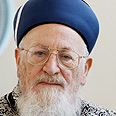
Former chief rabbi creates hotline for religious issues
Rabbi Mordechai Eliyahu launches telephone hotlines for clarifications and guidance on Jewish issues, including organ donation. Project manager says objective is 'to bridge between worlds,' both within religious population and between religious and secular
Hundreds of hotline operators, dozens of yeshivot, five languages, and one telephone number. The office of former Chief Rabbi of Israel Mordechai Eliyahu recently launched a hotline for Jewish issues that allows any caller to receive information and guidance on various topics 24 hours a day.
Among the topics to be covered are: marriage and relationships, raising children, faith, halacha, women's issues, spirituality and Kabbalah, finances, neighbor spats, purchasing mezuzot, and organ donation.
Chief Rabbi of Safed Shmuel Eliyahu initiated the project and recruited 34 heads of yeshivas from around the country, who then proceeded to recruit another 280 of their students and fellow rabbis to the project.
Together with relationship counselors, they will man the phones at the hotline's call center at all hours of the day. In unique cases, or when the questions are too difficult, the calls will be transferred to a specialized department that will also include senior rabbis from the Religious Zionism stream.
Rabbi Shmuel Eliyahu said, "We did a survey and learned that one third of secular people are interested in Judaism, but have no way of accessing it. Many of them have a large stereotype barrier against the religious population and are afraid they will make them religious.
"This hotline seeks to circumvent this issue. You can speak with the person without any commitment and without revealing your identity. This way, a very interesting connection is made between people who look very different on the street and would never speak with one another."
"The main idea is to bridge between different worlds," explained project manager Shraga Schmeidler. "Both within the religious world and all the spiritual styles, and also between religious and secular."
'Create connection beyond answering question'
According to Schmeidler, the service is aimed at the entire population, religious and secular alike, but that the first impression of the phone operators is that a majority of the callers will be secular or traditional, at least when the service is first launched. Schreiger believes this to be so because most advertisements for the service were placed in mixed cities and not in areas with high concentrations of religious people.
Schmeidler explained that the call operators have been instructed "not just to give an answer, but to create a connection beyond this with the inquirer." Suggestions for achieving this include suggesting a meeting, studying in pairs, or an invitation to spend Shabbat at the operator's home.
Schmeidler provided the example of a caller who contacted the hotline seeking relationship advice. The person who answered was a Safed rabbi, who responded, "We need to meet for this. It is not a phone conversation to conduct offhandedly."
The caller apparently immediately got in his car and drove to the north. In another incidence, a caller from the north purchased mezuzahs for her new house and found herself in a house-warming party with dozens of yeshiva students from Tiberias.
The hotline will serve a multitude of cultures, with service provided in Hebrew, Arabic, English, Russia, Amharic, and French. Though the hotline service still does not have a name, it does have a number – 1 599 599999.










